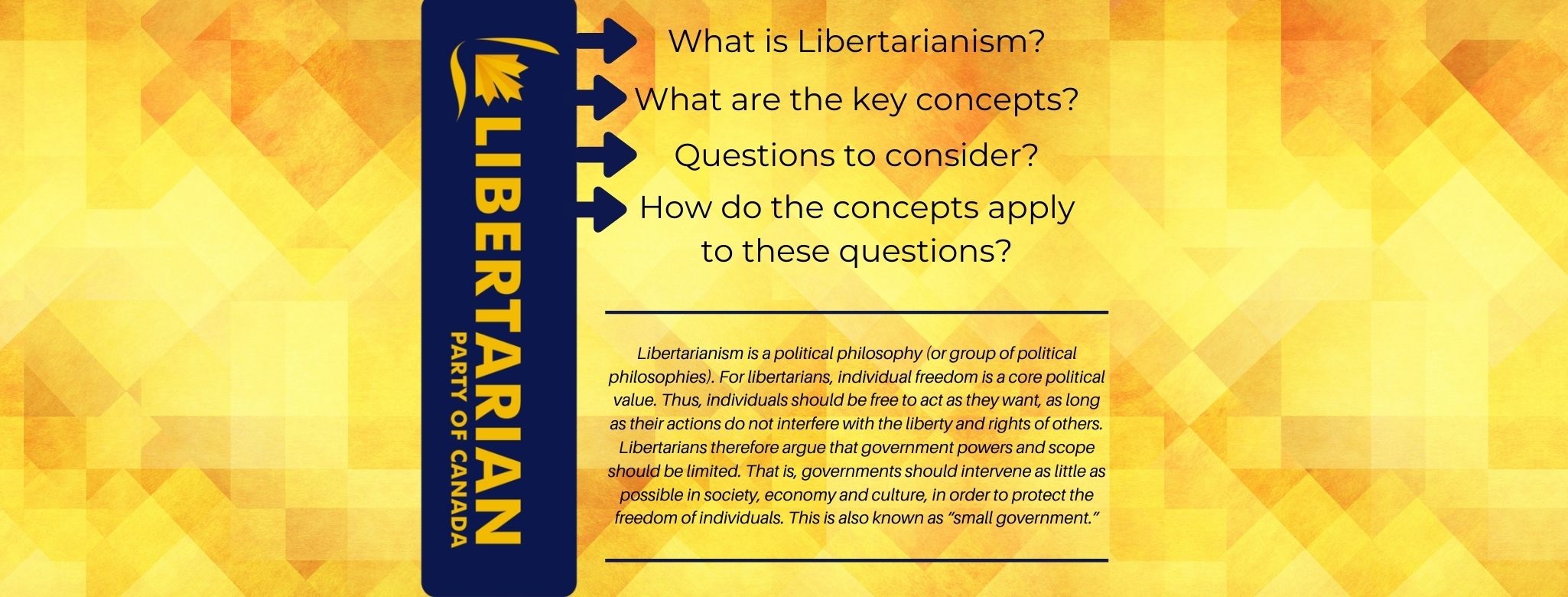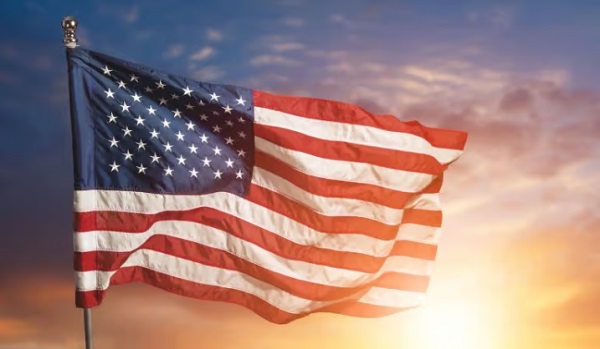Opinion
What is Libertarianism?

Libertarianism has developed over the course of many centuries. It is a deep and rich philosophy that cannot be fully described in one short article. Rather than delving into history, I want to share some of the key concepts of Libertarianism, some questions to consider and how I think the concepts apply in 2021.
Individualism
Key Concept: Only individuals make choices and therefore should be responsible for those decisions.
Questions to Consider: Should government start mandating one hour of exercise per day? Should government ban alcohol and tobacco? Should vehicles be removed from the road as they can lead to injury and death? Should government be given authority to remove all risk from our lives regardless of the resulting consequences of a zero-risk strategy?
How it applies in 2021: Health decisions should be the responsibility of each individual based on their own risk assessment. This applies in all situations and under all conditions.
Individual Rights
Key Concept: Individuals have the right to be secure in their life, liberty and property. Government is not the grantor of rights, rather the protector of said rights.
Questions to Consider: Should government be able to suspend individual rights indefinitely whenever a “public health crisis” presents itself? Should government pursue “climate lockdowns” in an effort to meet emissions targets?
How it applies in 2021: There is no justification for government to suspend the lives of its citizens, their freedoms or their ability to earn a living and provide for their families.
Spontaneous Order
Key Concept: The actions of millions of people working together in order to achieve their individual objectives is the origin of a civil society. Central government is not required for the development of languages, law, markets or other complex institutions.
Questions to Consider: Governments across the world were given unfettered power in response to the COVID-19 pandemic, were they able to effectively navigate this complex situation? Given government’s track record on the pandemic and other major issues, what is the outlook for a government led economic relaunch, post-COVID? If climate change is an existential threat, is government the best mechanism to address it?
How it applies in 2021: Big government policies result in inefficiencies, cronyism and corruption. Individuals working together to overcome common challenges is the most effective way to advance civil society.
The Rule of Law
Key Concept: Individuals are free to pursue their own dreams as long as they respect the equal rights of others. Laws should protect individual liberty rather than pursue a particular outcome.
Questions to Consider: Should the federal government, specifically the Prime Minister, be able to appoint judges in Canada? Should there be greater separation between the three branches of government in order to ensure impartiality?
How it applies in 2021: Recently, Trudeau appointed four Liberal Party donors as judges. It is reasonable to consider that these appointments will lead to future bias as can be seen in the recent Supreme Court decision regarding the federal carbon tax. Judges must make decisions based on the law, not personal bias or political pressure.
Limited Government
Key Concept: “Power tends to corrupt and absolute power corrupts absolutely” – Lord Acton. Throughout history, those countries with limited central authority have resulted in greater individual liberty, economic success and better standards of living.
Questions to Consider: Will governments willingly relinquish the power that they have acquired in response to the COVID-19 pandemic?
How it applies in 2021: Despite comprehensive data showing that lockdowns and other non-pharmaceutical measures had little to no impact on the transmission of COVID-19, many provinces in Canada still enforce public health orders. Certain US states which pursued a response based on individual liberty have seen similar direct COVID-19 health impacts, but have faired significantly better in their economic recovery and saw reduced mental health impacts.
Free Markets
Key Concept: Property rights and free markets enable individuals to succeed. Less government intervention in the market, leads to greater prosperity for the individual.
Questions to Consider: What are the short and long term consequences of governments paying some Canadians to sit at home for 16+ months? If an individual is willing to accept the risks within the marketplace to create opportunities for him/herself, their family and their community, should the government be able to step in and say no?
How it applies in 2021: Over the past 16+ months, unprecedented government intervention in the marketplace has led to the largest transfer of wealth from the low and middle class to the wealthy in human history. Property rights and individual liberty must never be restricted in this way again as the measures put in place by governments harmed the very people they were intended to protect.
Virtue of Production
Key Concept: There is dignity in work. Libertarians believe that individuals should keep what they earn, rather than a central authority redistributing wealth through taxation.
Questions to Consider: What has been the impact of 16+ months of lockdowns on Canadians mental health? Were government subsidy programs effective in delivering funds from one taxpayer to another?
How it applies in 2021: Government programs, however well intentioned, never deliver the results that they initially intend to produce. If Canadians were afforded the ability to work throughout the pandemic, to maintain their employer/private health insurance and keep their hard earned money in their pockets, they would have been a much better position to fight a virus than if they transmitted the virus while unemployed, isolated and poor.
Harmony of Interests
Key Concept: One individual’s plans for employment, business or otherwise may conflict with someone else’s. In a free society, these individuals work together to find a solution that works for all parties. When government intervenes, political pressure leads to handouts and favours to small groups to the determent of others.
Questions to Consider: Aside from war times, has there ever been a period in history that resulted in as much lobbying activity as over the past 16+ months during the pandemic? Did the numerous handouts and favours help the average Canadian or connected insiders? Who ultimately pays for the handouts given to connected insiders?
How it applies in 2021: There have been a number of examples of private industry taken the initiative to create solutions to significant problems over the past 16+ months. One such example would be the COVID-19 testing program at the Calgary International Airport. This allowed the safe and free flow of people who wished to travel internationally. Instead of allowing the private sector to continue this program, the Federal Liberal government enacted the quarantine hotel program which led to division, inefficiencies and sexual harassment within the facilities. Which outcome is preferable for Canadians? I think the answer is quite obvious.
Peace
Key Concept: Free individuals have the right to defend their families, communities and property from foreign and domestic threats. The act of war however, leads to death and destruction and results in more power being transferred to the government.
Questions to Consider: Has the government fulfilled one of its basic duties in protecting Canadians from foreign threats, this one in the form of a virus? Why was the only acceptable solution for protecting Canadians against the virus to lock them up for 16+ months? Is the cure worse than the disease?
How it applies in 2021: War in the tradition description has not been seen by the Western world for a significant period of time now. Instead, we are directly involved in a war of ideologies. This is fought in the media, the classrooms, in businesses and in government. In order to preserve their Charter Rights, Canadians must be able to maintain freedom of speech, the most important Charter Right. The introduction of Bill C-10 and Bill C-36 by the Federal Liberal government strikes a significant blow to Canadians ability to speak freely. Government should be protecting our Charter Rights, not actively stripping them away.
Whatever the question is, liberty is the answer.
Sincerely,
Jared Pilon
Libertarian Party Candidate for Red Deer – Mountain View, AB
https://www.jaredpilon.com/
Bruce Dowbiggin
The Pathetic, Predictable Demise of Echo Journalism

It can be safely said that the 2024 U.S. presidential election couldn’t have gone much worse for legacy media in that country. Their biases, conceits and outright falsehoods throughout the arduous years-long slog toward Nov. 5 were exposed that night. Resulting in the simultaneous disaster (for them) of Donald Trump winning a thunderous re-election and their predictive polling being shown to be Democratic propaganda.
Only a handful of non-establishment pollsters (Rasmussen, AtlasIntel) got Trump’s electoral college and overall vote correct. Example: One poll by Ann Selzer in Iowa—a highly-rated pollster with a supposedly strong record—showed a huge swing towards Harris in the final week of the election race, putting her three points up over Trump. He ended up winning Iowa by 13.2 points (Selzer now says she’s retiring.)
Throughout, these experts seemed incapable of finding half the voter pool. By putting their thumb on the scale during debates, the representatives of the so-called Tiffany networks and newspapers signalled abdication of their professional code. Their reliance on scandal-sheet stories was particularly glaring.
Just a few lowlights: “the brouhaha over a shock comedian at a Trump rally calling Puerto Rico “a floating island of garbage”. Unhinged outgoing POTUS Biden then called GOP voters “garbage”. So Trump made an appearance as a garbage man, to the snarky disapproval of CBS News chief anchor Nora O’Donnell.

Then there was Whoopi Goldberg on The View predicting Trump will “break up interracial marriages and redistribute the white spouses: “He’s going to deport and you, put the white guy with someone else… The man is out there!” Media ran with this one, too.
Worse, disinformation and lying reached such a proportion that Team Trump turned its campaign away from the networks and legacy papers down the stretch, creating a new information pathway of podcasts and social media sites (such as Joe Rogan, Theo Von and Adin Ross) that promise to be the preferred route for future candidates looking for non-traditional voters. A few prominent media owners sought to save themselves by refusing to endorse a presidential candidate, but the resulting tantrum by their Kamala-loving staff negated the effort.
In the past, poor performances by the Media Party might be dismissed or ignored. But the cataclysmic ratings drops for CNN and MSNBC paired with collapse in sales for blue-blood rags such as the New York Times, Washington Post and L.A. Times spoke to the public’s disgust with people they’ve always trusted to play it straight.
(Now Comcast has announced it’s spinning off MSNBC and its news bundle to save their profitable businesses. Staff members in these places are now panicking. As such the new administration promises to be indifferent to the former media powers-that-be as Trump mounts radical plans to recast the U.S. government. )
As noted here the disgraceful exercise in journalism was cheered on by their compatriots here in Canada. “In the hermetically sealed media world of Canada, natives take their cues from CNN and MSNBC talking points both of which employ Canadians in highly visible roles. (Here’s expat Ali Velshi famously describing on NBC that the 2020 George Floyd riots that burned for weeks— destroying billions in damages while resulting in multipole deaths— as “generally peaceful”.)
The narratives of Russiagate, drinking bleach, “fine people” to Hunter Biden’s laptop— long ago debunked down south— are still approved wisdom in Canada’s chattering class. Especially if America’s conflagration election can be used to demonstrate the good sense and judgment of Canada’s managerial and media class.
The clincher for star-struck Canadians was the overwhelming Kamala love from the Hollywood crowd. Virtually every high-profile actor/ singer/ writer embraced the woman who was parachuted into the nomination in a coup— even as the same glitterati raved about anti-democratic Trump. From Beyoncé to Bilie Eilish to Bruce Springsteen, their support was been a winner in Canada’s fangirl/ fanboy culture.”
Talk about backing a loser. Which leaves us asking what to expect from formerly respected media in the upcoming (it will come, won’t it?) defenestration of Justin Trudeau and Jagmeet Singh, probably in spring of 2025. One Toronto Star piece might provide a clue to the bunkered approach of Canada’s globalists. “Europe is leaving Donald Trump’s America behind. Should Canada do the same? As American democracy dives into darkness, Canada is facing difficult choices.”
CPC leader Pierre Poilievre has made it abundantly clear his thoughts on the bias of media. To save billions, he is making a major overhaul— even closure of CBC (not Radio Canada)— as a campaign pledge. He’s also said he will remove the slush fund now propping up failed establishment news organizations that employ unionized workers bent of crushing the Conservatives.
His scorn is obvious after watching media’s reverential treatment of Trudeau’s fake “murdered” Rez children stunt or the silence accompanying PMJT’s sacking of his indigenous Justice minister Jodie Wilson Raybould. Lately, a deadpan Poilievre humiliated a callow CBC reporter quoting “experts” by asking her “what experts?” Her unpreparedness leaves her floundering as Poilievre calls her question another “CBC smear job”.

Perhaps the classic Poilievre humbling of a reporter occurred in 2023 in a Kelowna apple orchard when a reporter seeking to score points with his Woke colleagues saw the bushwhack rebound on him. After numerous failed attempts at belling the cat, the local reporter played his ace card.
Question: Why should Canadians trust you with their vote, given … y’know … not, not just the sort of ideological inclination in terms of taking the page out of Donald Trump’s book, but, also —
Poilievre: (incredulous) What are you talking about? What page? What page? Can you gimme a page? Gimme the page. You keep saying that … “
No page was produced and the cringeworthy interview collapsed.
Needless to say, the reporter was absolved by his water-carrying colleagues. Here was Shannon Proudfoot of the Toronto Star: “Kicking a journalist in the shins over and over then turning the exchange into a social-media flex is telling on yourself…” Venerable CBC panelist/ Star columnist Chantal Hébert echoed the pauvre p’tit take. “Agreed”.

For these press box placeholders it’s all too reminiscent of the acid-drenched style of former PM Stephen Harper, a stance that turned them to Trudeau cheerleaders in 2015. Which is to say we shouldn’t have high hopes for balance when the writ is finally dropped.
Poilievre has several more ministers (Melissa Lantsman, Garrett Genuis) skilled in exposing media imbalance, so we can expect full-blown pushback from the paid-for media from the usual suspects when Trudeau finally succumbs to reality. One drawback for the Conservatives could be the absence of national podcasters such as Rogan or Von to which they can pivot.
But make no mistake, However much Canada’s press corps denies it, the public has turned away from Mr Blackface and the politics of privilege. They’d best anticipate a rough ride ahead.
Bruce Dowbiggin @dowbboy is the editor of Not The Public Broadcaster A two-time winner of the Gemini Award as Canada’s top television sports broadcaster, he’s a regular contributor to Sirius XM Canada Talks Ch. 167. His new book Deal With It: The Trades That Stunned The NHL And Changed hockey is now available on Amazon. Inexact Science: The Six Most Compelling Draft Years In NHL History, his previous book with his son Evan, was voted the seventh-best professional hockey book of all time by bookauthority.org . His 2004 book Money Players was voted sixth best on the same list, and is available via brucedowbigginbooks.ca.
Business
CBC’s business model is trapped in a very dark place

I Testified Before a Senate Committee About the CBC
I recently testified before the Senate Committee for Transport and Communications. You can view that session here. Even though the official topic was CBC’s local programming in Ontario, everyone quickly shifted the discussion to CBC’s big-picture problems and how their existential struggles were urgent and immediate. The idea that deep and fundamental changes within the corporation were unavoidable seemed to enjoy complete agreement.
I’ll use this post as background to some of the points I raised during the hearing.
You might recall how my recent post on CBC funding described a corporation shedding audience share like dandruff while spending hundreds of millions of dollars producing drama and comedy programming few Canadians consume. There are so few viewers left that I suspect they’re now identified by first name rather than as a percentage of the population.
Since then I’ve learned a lot more about CBC performance and about the broadcast industry in general.
For instance, it’ll surprise exactly no one to learn that fewer Canadians get their audio from traditional radio broadcasters. But how steep is the decline? According to the CRTC’s Annual Highlights of the Broadcasting Sector 2022-2023, since 2015, “hours spent listening to traditional broadcasting has decreased at a CAGR of 4.8 percent”. CAGR, by the way, stands for compound annual growth rate.
Dropping 4.8 percent each year means audience numbers aren’t just “falling”; they’re not even “falling off the edge of a cliff”; they’re already close enough to the bottom of the cliff to smell the trees. Looking for context? Between English and French-language radio, the CBC spends around $240 million each year.
Those listeners aren’t just disappearing without a trace. the CRTC also tells us that Canadians are increasingly migrating to Digital Media Broadcasting Units (DMBUs) – with numbers growing by more than nine percent annually since 2015.
The CBC’s problem here is that they’re not a serious player in the DMBU world, so they’re simply losing digital listeners. For example, of the top 200 Spotify podcasts ranked by popularity in Canada, only four are from the CBC.
Another interesting data point I ran into related to that billion dollar plus annual parliamentary allocation CBC enjoys. It turns out that that’s not the whole story. You may recall how the government added another $42 million in their most recent budget.
But wait! That’s not all! Between CBC and SRC, the Canada Media Fund (CMF) ponied up another $97 million for fiscal 2023-2024 to cover specific programming production budgets.
Technically, Canada Media Fund grants target individual projects planned by independent production companies. But those projects are usually associated with the “envelope” of one of the big broadcasters – of which CBC is by far the largest. 2023-2024 CMF funding totaled $786 million, and CBC’s take was nearly double that of their nearest competitor (Bell).
But there’s more! Back in 2016, the federal budget included an extra $150 million each year as a “new investment in Canadian arts and culture”. It’s entirely possible that no one turned off the tap and that extra government cheque is still showing up each year in the CBC’s mailbox. There was also a $93 million item for infrastructure and technological upgrades back in the 2017-2018 fiscal year. Who knows whether that one wasn’t also carried over.
So CBC’s share of government funding keeps growing while its share of Canadian media consumers shrinks. How do you suppose that’ll end?
We make content free for you but we require support to create journalism. Please consider a free subscription to our newsletter, or donate an amount of your choice.
-

 Brownstone Institute2 days ago
Brownstone Institute2 days agoThe Most Devastating Report So Far
-

 Business2 days ago
Business2 days agoCarbon tax bureaucracy costs taxpayers $800 million
-

 ESG1 day ago
ESG1 day agoCan’t afford Rent? Groceries for your kids? Trudeau says suck it up and pay the tax!
-

 Daily Caller1 day ago
Daily Caller1 day agoLos Angeles Passes ‘Sanctuary City’ Ordinance In Wake Of Trump’s Deportation Plan
-

 John Stossel1 day ago
John Stossel1 day agoGreen Energy Needs Minerals, Yet America Blocks New Mines
-

 COVID-192 days ago
COVID-192 days agoDr. McCullough praises RFK Jr., urges him to pull COVID shots from the market
-

 MAiD2 days ago
MAiD2 days agoOver 40% of people euthanized in Ontario lived in poorest parts of the province: government data
-

 Alberta1 day ago
Alberta1 day agoProvince considering new Red Deer River reservoir east of Red Deer







